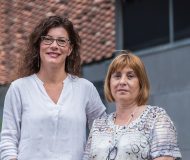

The Cellular Cultures Platform of the Research Institute of the Hospital de la Santa Creu i Sant Pau – IIB Sant Pau, coordinated by Estefanía Segalés, is a service that offers different facilities where you can work with both primary cultures obtained from human tissues and experimental animal cultures, as well as continuous cell lines and Genetically Modified Organisms (GMOs) of levels I and II.
Users have the necessary basic equipment to obtain and maintain cell cultures: 25 laminar flow hoods and biological safety cabinets, 28 CO2 incubators, ovens, centrifuges, water baths, inverted microscopes, balances, vacuum traps, cell counters, refrigerators, freezers (-20 and -80°C), hybridization ovens, and autoclaves.
As a user of this platform, Dr. Alba Tristán Noguero, a postdoctoral researcher in the Molecular Pathophysiology of Synaptic Plasticity Group at IIB Sant Pau, explains that they mainly use it to maintain primary mouse neuron cultures and human neurons in co-culture with murine astrocytes.
“The infrastructure of the Cellular Cultures Service has helped us in the project of the Molecular Physiology of Synaptic Plasticity laboratory, allowing the study of SYNGAP1-related developmental epileptic encephalopathy. With the establishment and maintenance of these human and murine cultures, we have been able to better understand the pathophysiology of the disease and test different treatments.”
What Dr. Tristán apreciates the most about the Cellular Cultures Platform is “the perfect organization and management, as well as the availability to answer questions and adapt to the users’ needs.”
On the other hand, David Santos, a researcher in the group studying diseases characterized by lipid alterations, explains that he spends at least one-third of his working day in the Cellular Cultures Platform. “Most of the experimental work I do depends on cell cultures, from cellular metabolism studies to the injection of labeled foam cells with isotopes into animal models of experimentation.”
For him, this service is indispensable, “without this platform, it would be impossible for me to carry out these experiments. On the other hand, having this platform has allowed me to carry out important collaborations with other research groups, both nationally and internationally.”
This researcher highlights that reliability is one of the aspects he values the most about this platform. “Knowing that I leave my cultures in a secure area where regulations are met, both to protect the user and the cells, in terms of contamination control, equipment supervision and maintenance, PPE administration, among others, gives me peace of mind when performing my experiments and validating the results I obtain.”